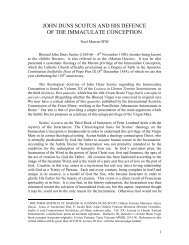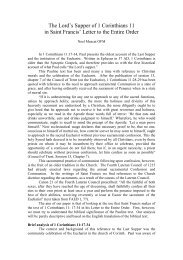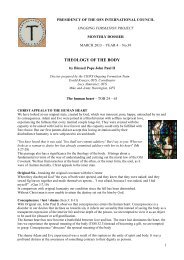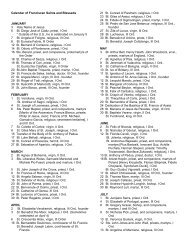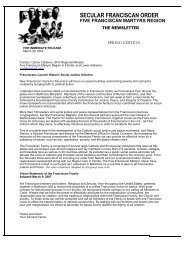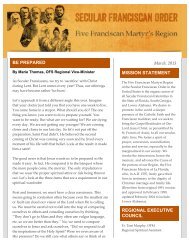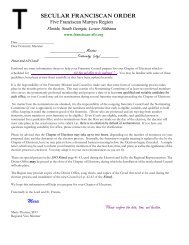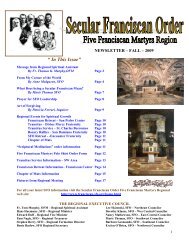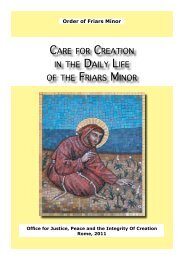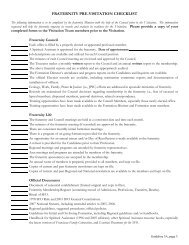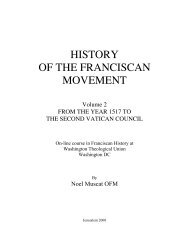June 2010 - Five Franciscan Martyrs Region
June 2010 - Five Franciscan Martyrs Region
June 2010 - Five Franciscan Martyrs Region
Create successful ePaper yourself
Turn your PDF publications into a flip-book with our unique Google optimized e-Paper software.
During the incident at Antioch,<br />
to which Paul refers in Galatians 2:11-<br />
14, when Peter began to avoid the<br />
company of Gentile-Christians and not<br />
to have food with them, according to<br />
the same Paul this was the fault of<br />
“certain friends of James” (Gal 2:12),<br />
who the apostle also calls “false brothers”<br />
(Gal 2:4), who were insisting that<br />
nobody could be saved without circumcision<br />
and the Law of Moses. We<br />
know that James had not authorised<br />
anyone to utter such declarations, but<br />
in the Judaeo-Christian community of<br />
Jerusalem there were many converts<br />
from the party of the Pharisees who<br />
were very tough regarding the observance<br />
of the Jewish religion, and who<br />
saw in James the guarantee of the<br />
orthodoxy of the Jewish traditions in<br />
Christianity, and wanted to impose<br />
these traditions on the pagans who<br />
were also converted to Christianity.<br />
James is also mentioned in Acts<br />
21:17-26, when Paul went to Jerusalem<br />
after the third missionary journey in<br />
order to bring the offerings of the<br />
Churches of Macedonia and Achaia in<br />
favour of the poor members of the<br />
Church of Jerusalem. It was in that<br />
occasion, in AD 58, that Paul went to<br />
visit James, bishop of Jerusalem, who<br />
with the elders praised God for the<br />
wonders that Paul had accomplished<br />
among the pagans, but who also<br />
advised Paul to go to the temple and<br />
pay the expenses of a nazirite vow of<br />
seven men, in order that he would outwardly<br />
declare in front of the Jews<br />
that he had no problem in going to<br />
pray in the temple and in observing<br />
the Law of Moses.<br />
THE LETTER OF JAMES<br />
One of the so-called Catholic<br />
Letters of the NT has as its author the<br />
apostle James. When the Churches<br />
accepted the canonicity of this writing<br />
Bible Sudies<br />
they identified its author with James<br />
“brother of the Lord”, who exercised<br />
an important role in the Christian community<br />
of Jerusalem.<br />
Such an attribution, in fact, is<br />
not without difficulties. First of all,<br />
although there does not seem to have<br />
been a problem regarding the canonical<br />
nature of the Letter in Egypt, and<br />
Origen quotes it as inspired Scripture,<br />
Eusebius of Caesarea, in the beginning<br />
of the 4 th century admits that it was<br />
still under discussion as a canonical<br />
writing. In the Churches of Syria the<br />
Letter entered into the canon in the<br />
4 th century. In Africa it is not mentioned<br />
neither by Tertullian nor by<br />
Cyprian of Carthage. In Rome the<br />
Letter of James is not to be found in<br />
the Muratorian Canon, attributed to<br />
Saint Hippolytus (c. 200), and there is<br />
no certainty as to whether Clement of<br />
Rome and the Pastor of Hermas do in<br />
fact quote it.<br />
If it is truly James who wrote<br />
this Letter, it is difficult to understand<br />
how it took 4 centuries for the Church<br />
to accept it among the canonical books<br />
of the NT. The Letter was written<br />
directly in Greek, with a certain elegance<br />
of style and a richness of vocabulary<br />
and rhetoric. All these details<br />
leave us with a doubt as to whether it<br />
could come out of the pen of a man<br />
from Galilee like James, even though<br />
he might have made use of the service<br />
of a disciple who was well versed in<br />
Hellenistic culture.<br />
If we accept the authenticity of<br />
this Letter we have to place its composition<br />
before AD 62, the year which<br />
marks the date of the martyrdom of<br />
Saint James, bishop of Jerusalem. We<br />
know that the Letter of James betrays<br />
a contrast with the Letter to the<br />
Romans, since whereas Paul insists<br />
upon justification through faith, James<br />
insists upon faith that is made evident<br />
through good works. The Letter is<br />
addressed “to the twelve tribes of the<br />
20 THE LAND OF THE PROMISE - <strong>June</strong> <strong>2010</strong>



